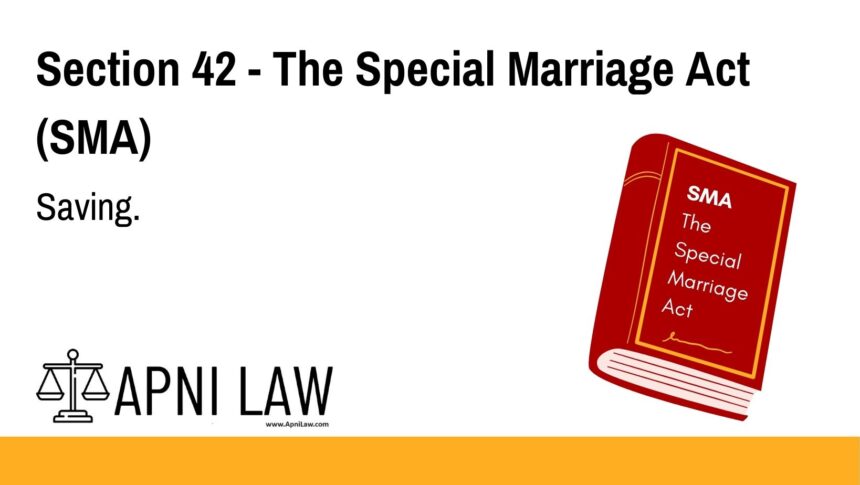Code: Section 42 of The Special Marriage Act (SMA)
42. Saving
Nothing in this Act shall be construed to affect any law relating to marriage, divorce, or nullity of marriage that is applicable to any person under any other law in force in India.
In other words, this section ensures that the provisions of The Special Marriage Act do not override or affect the application of other relevant laws governing marriage, divorce, or nullity of marriage for people governed by different laws.
Explanation of Section 42
Section 42 of The Special Marriage Act provides an important “saving” clause. This clause ensures that individuals governed by different personal laws, such as the Hindu Marriage Act or Muslim Personal Law, can still follow their respective laws regarding marriage, divorce, and nullity of marriage.
Key Provisions:
- Protection of Personal Laws: Section 42 ensures that personal laws relating to marriage, divorce, and nullity of marriage continue to apply. Therefore, even if a person marries under The Special Marriage Act, they will still be subject to the personal laws that govern their community.
- No Overriding of Other Laws: The section also clarifies that the provisions of The Special Marriage Act do not override other laws. For example, if a person married under the Special Marriage Act is a Hindu, the Hindu Marriage Act will still apply for matters like divorce.
Illustration
Example 1: A Hindu Couple Married under SMA
Consider a Hindu couple who marries under The Special Marriage Act instead of the Hindu Marriage Act. Even though they choose this route, Section 42 ensures they remain governed by the rights and provisions of the Hindu Marriage Act in the case of a divorce or dispute.
Example 2: A Muslim Woman Seeking Divorce
A Muslim woman married under The Special Marriage Act can still seek a divorce under Muslim Personal Law. Section 42 ensures that her rights under Muslim law are not lost simply because she married under the Special Marriage Act.
Common Questions and Answers on Section 42
1. Can I marry under The Special Marriage Act and still follow my personal laws?
- Answer: Yes, Section 42 allows you to marry under The Special Marriage Act without losing the benefits of your personal laws. You can still follow the laws that apply to your religion or community.
2. Does Section 42 allow people to apply for divorce under their personal laws?
- Answer: Yes, it does. Section 42 ensures that people who marry under The Special Marriage Act can still apply for divorce under their personal laws, like the Hindu Marriage Act or Muslim Personal Law.
3. How does Section 42 affect the rights of individuals under personal laws?
- Answer: Section 42 protects the rights of individuals. It ensures that marriage, divorce, and nullity of marriage issues are governed by the personal laws of the individuals, even if they marry under The Special Marriage Act.
Conclusion
Section 42 of The Special Marriage Act acts as a safeguard. It protects the rights of individuals governed by personal laws. As a result, people marrying under The Special Marriage Act can still follow their personal laws concerning marriage, divorce, and nullity of marriage. This provision strikes a balance between uniform and personal laws in India, offering both flexibility and fairness.








